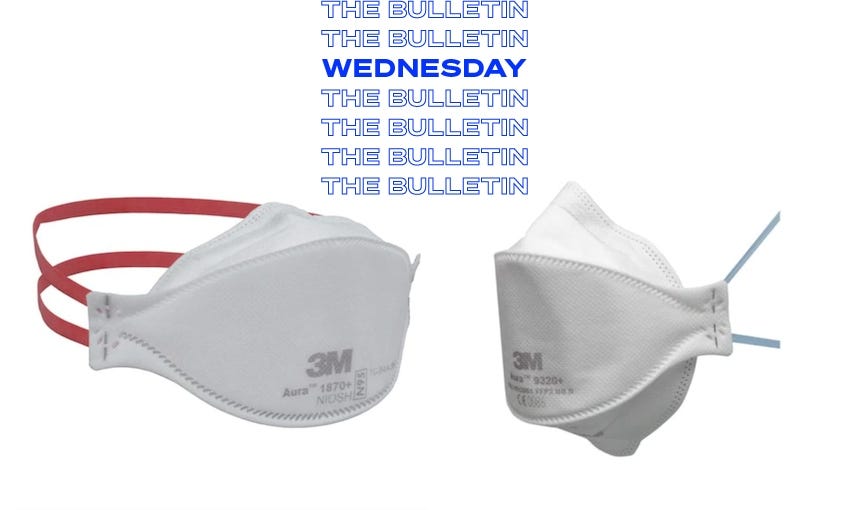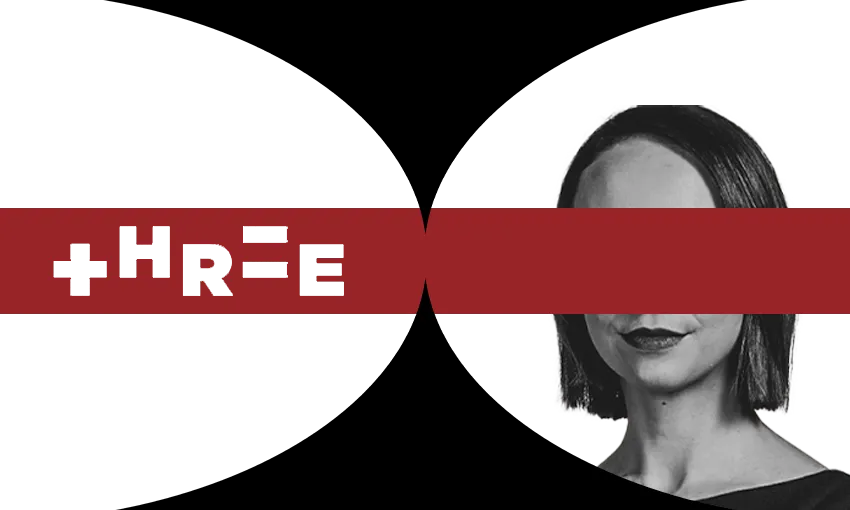Tighter mask rules are coming
Rapid antigen tests won’t be made available to the public, with the prime minister saying essential workers will get the limited supply
Mōrena and welcome to The Bulletin for Wednesday, January 26, by Justin Giovannetti. Presented in partnership with Z Energy.
In today’s edition: Efeso Collins to run for mayor; port of Tauranga running out of space; privacy office to fine nosy landlords; but first, a series of tweaks to deal with omicron.
Masks like these will soon be mandatory for those covered by vaccine mandates. (3M)
The government’s months-old rule allowing any kind of face covering is over. Workers covered by a vaccine mandate will need to wear a medical-grade mask or N95 respirator within nine days, the prime minister announced yesterday. While people visiting restaurants or other businesses will need to wear a proper mask. A scarf or bandanna pulled up over the face won’t do it anymore. As One News reports, Jacinda Ardern said the science on mask use has changed and people need to up their game. While experts have been warning for weeks that cloth masks no longer protect against omicron, the government’s latest tightening of the rules hasn’t yet forbid their use by people not covered by vaccine mandates.
Rapid antigen tests will be rationed for essential workers in isolation. While millions of rapid tests are now entering the country, Ardern said yesterday that they won’t be made widely available to members of the general public. As The Spinoff’s live updates reported, with 83 million of the tests on order, only 14 million will arrive by the end of February. What rapid tests the country has will be held back to secure New Zealand’s supply chains and help essential workers, especially those in the country’s food system, exit isolation quickly. For the rest of the population, lab-based PCR tests will remain the default option—expect for unvaccinated domestic air travellers, who still have access to rapid tests.
The Spinoff’s Covid data tracker has the latest figures.
Despite the prime minister’s direction that the public not use rapid tests, demand is likely to surge in the coming weeks. The Waikato Times offers a peek into the kind of requests likely, with the regional council seeking to allow unvaccinated councillors to attend in-person meetings as long as they can show proof of two negative rapid tests.
A flaw in the government’s testing plan. To boost PCR testing levels, labs will be able to surge up to 77,600 tests daily for up to a week according to One News. That’s nearly double the rate during the delta outbreak. As Dileepa Fonseka writes for Stuff, that testing level is based on pooling samples together and testing a batch at once. While that’s a good approach when there’s little Covid-19 in the community, omicron is likely to spread quickly. When that happens, the pooling system stops working and testing capacity falls quickly as labs need to look at each sample separately. That’s what happened in Australia.
Isolation rules are likely to be shortened in the coming weeks: Baker. If you get Covid-19, you’re now expected to self-isolate for 14 days. Michael Baker told RNZ that while that length of time makes sense at the moment, it’ll need to be shortened in the future to as few as seven days. The epidemiologist said that omicron’s shorter incubation time, of about three days, has led to a drop internationally in isolation periods. Another rule that requires household contacts to isolate for 10 days following the end of an infected person’s 14 day period, a total of 24 days, could also be changed.
The education minister has conceded his previous plan to improve school ventilation, open windows, needs some assistance. Students returning to school might soon see a new addition in classrooms as the government has ordered 5,000 portable air cleaners to combat omicron, Stuff reports. The education minister had ruled out a similar purchase as recently as last month, citing the prohibitive cost. Opening windows and doors is free, he told reporters before the Christmas holiday. The ministry then conducted research that found that air flow is essential and windows aren’t always enough. Most of the filters now won’t arrive for some months, with 500 expected in March and the rest in June. The country has over 2,500 schools, so most classrooms won’t get one.
The government will unveil its plans this afternoon to combat omicron once it grows to being a sizeable outbreak in the community, with new rules on isolation and testing.
A note from Duncan Greive, publisher of The Spinoff. Omicron means that, yet again, we at The Spinoff will be devoting significant resources to covering this enormous and complex story. It comes just as we caught our breath after delta, which arrived and hit our commercial revenues hard just as we’d made a major investment in people—hiring more journalists, along with data and technology specialists to help make our work more robust, tactile and accessible.
I need to be frank: We have never experienced anything remotely so challenging as the past six months. I approach the coming weeks with trepidation, as so many others in business will be doing. So if you value what we do, please donate today. Every dollar is ring-fenced to support journalism, and right now we need reader support more than ever.
One more thing: if your organisation wants to partner or advertise with The Spinoff, we would really love to hear from you: contact our head of commercial Saj Patel to find out how to get involved across our platforms.
Efeso Collins commits to running for Auckland mayor. Speaking with The Spinoff’s Toby Manhire, the outspoken South Auckland councillor said he’s prepared to run without Labour’s backing. With Phil Goff unlikely to seek the office again, there’s been a suggestion the outgoing mayor and Labour are likely to back Richard Hills. Collins has met with Goff, but hasn’t heard back about how the election might go. Manhire looks at the Collins’ pitch and who in a growing field might take over the country’s largest city after October’s election.
New Zealand’s largest port could soon run out of capacity, adding to supply chain woes. The NZ Herald (paywalled) reports that the port of Tauranga needs resource consent soon for a berth extension before it runs out of room for increasing freight volumes. The extension was proposed in 2018 and was twice rejected for the government’s fast-track programme to avoid the Environment Court. At current rates the port says it will run out of room in two to three years, and the extension will need two-and-a-half years to build. That would assume no further delays. A number of businesses have expressed concerns about what would happen if Tauranga got more congested.
The Privacy Commission is ready to crack down on intrusive questions from landlords. Prospective tenants have been asked about their race, gender, sexual orientation, political views and future plans for children. The commission told RNZ some of the requests were highly questionable based on the country’s privacy laws. From March, the commission will be looking closely at tenancy applications, any landlords or property managers who overstep the law will face fines of up to $10,000. FYI: All the questions at the top of this paragraph likely violate one or a number of laws.
The scatological world of whale poo traders. The Otago Daily Times looks at the secret trade in fossilised whale faeces and bones. Selling at $40,000 per kilogram, it’s worth only half as much as gold, but gold doesn’t often wash up on New Zealand’s shores. A Dunedin woman found a 100 gram lump on a beach last year and sold it for a tidy profit. While given the posh name of ambergris on labels, whale poo ends up in perfume, including Chanel No. 5. Before you head out to look for some, ambergris is pretty rare, so your chances of running into a nugget on the beach aren’t great. But if you see a smelly ball of goop, maybe pick it up. Or don’t.
Got some feedback about The Bulletin, or anything in the news?
Get in touch with me at thebulletin@thespinoff.co.nz
Right now on The Spinoff: Dawn Duncan & Andrew Geddis consider the worrying implications of the Tova O’Brien decision on employment law. Sam Brooks explains why you can’t watch Drag Race in New Zealand, or can you? essa may ranapiri reviews a book that finally allows for a sense of space and peace. Te Maire Tau writes that the anti-three waters crowd has a fundamental misunderstanding of democracy.
In defence of Nick Kyrgios. The Australian tennis player might be “the best player never to win a slim”, but the NZ Herald (paywalled) has come up with five reasons not only to like Kyrgios, but to find him the best thing about men’s tennis. The crowds in Melbourne might not agree.






